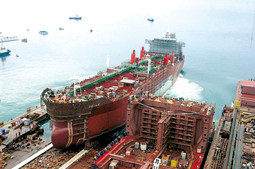Published in Nacional number 726, 2009-10-13
A DESPERATE gesture for the shipyards
Polancec's jeremiad for the EU
DEPUTY PRIME MINISTER Damir Polancec has sent a dramatic letter to Brussels in which he asks the European negotiators to soften the conditions of the tenders for the privatisation of the Croatian shipyards
 THE PRIVATISATION OF THE SHIPYARDS Damir Polancec at the opening of the bids for the shipyards with Slobodan Ljubicic, a businessman who would like to build a new town in place of Brodotrogir
The only way for the second round of the privatisation of Croatia's shipyards to not turn into a complete fiasco is if Croatian Government, i.e. the Privatisation Fund significantly softens the current strict conditions of the tender. If that does not happen it is quite certain, and some investors have made public knowledge of the fact, that the attempt to privatise them could turn out to be a total flop. Of the 27 companies that have expressed an interest only two bids have been tendered in the first round, and if nothing changes the outcome of the second round could be even worse - one or no offers at all.
THE PRIVATISATION OF THE SHIPYARDS Damir Polancec at the opening of the bids for the shipyards with Slobodan Ljubicic, a businessman who would like to build a new town in place of Brodotrogir
The only way for the second round of the privatisation of Croatia's shipyards to not turn into a complete fiasco is if Croatian Government, i.e. the Privatisation Fund significantly softens the current strict conditions of the tender. If that does not happen it is quite certain, and some investors have made public knowledge of the fact, that the attempt to privatise them could turn out to be a total flop. Of the 27 companies that have expressed an interest only two bids have been tendered in the first round, and if nothing changes the outcome of the second round could be even worse - one or no offers at all.
Croatian Government sees this epilogue as the worst possible scenario as it would produce a number of serious problems. The shipyards would have to go into receivership, tens of thousands would find themselves out of a job overnight, the national budget would suffer and it would all have a poor effect on the negotiations on Croatian accession to the European Union. As a result Deputy Prime Minister and Economy Minister Damir Polancec sent a dramatic letter to Brussels ten days ago in which he asks European negotiators to soften the conditions of the privatisation tenders for the privatisation of the shipyards without delay and a meeting as soon as possible with the European Competition Commissioner Neelie Kroes.
And while the Croatian press reported a few days ago that the European Commission has not been officially notified of the process of the privatisation of the shipyards, and that this was why no one from Brussels had offered any commentary on the failed first round, this is not in fact the case. Nacional has come into possession of the letter, by way of European diplomatic sources, that Damir Polancec sent to Commissioner Kroes back on 2 October, just two days after the public opening of the bids that had arrived in the first round of the tender. In his letter Polancec informed the European Commissioner, in brief, of the outcome of the first round of the privatisation of the shipyards.
"In 2009 it was almost impossible to acquire lines of credit needed for the construction of new ships, even with government guarantees. As a result the shipyards stopped paying their obligations towards suppliers and could not meet their obligations towards the national budget. In addition, some shippers withdrew their orders for new ships, which resulted in unused shipyard capacities.
This situation in 2009 greatly increased the obligations of the shipyards, and the circumstances that ensued affected the decisions made by investors regarding their participation in the privatisation of Croatian shipyards," Polancec wrote and added that "In light of the above stated we received only two offers, one for Brodotrogir and the other for BSO. During the time of the tender we communicated with the bidders, who expressed their interest for the privatisation and who informed us that they did not tender bids for two reasons important to them. [...] They are of the opinion that, as is the case in the obligations of the shipyards that are covered by government guarantees, that Government should also undertake those guarantees that are not insured by government guarantees.
The second reason is the obligation of a new investor to secure 40% participation in the costs of restructuring - a condition they all feel is impossible to meet." That it is the goal of Croatian Government to as quickly as possible invite bids for the second round of the tender for the shipyards is evident from the end of Polancec's letter in which he asks Commissioner Kroes for a meeting to be held as soon as possible.
"I would be grateful if you could organise a meeting that would allow me to personally inform you of the outcome of the first round of the tender, what has been established and our position, so that we might move on and open the second round of the privatisation tender in as short a time as possible."
Simply put, Polancec needs to convince the European negotiators to soften the current conditions of the tender in at least two areas in a very short space of time. That this will be a difficult task is borne out by the fact that the European Commission sought at the very start that bidders participate in 50 percent of the cost of restructuring, and that this was only reduced to 40 percent are several months of tough negotiating.
If Brussels does not consent to the further reduction of the requested participation, which for most of the shipyards is estimated to be about 5 billion kuna, Croatian Government could adopt a decision that would indirectly work in the favour of investors - Government could decide to calculate the compensation for exempted maritime demesne at the current value, and to return these minimum sums to the shipyards, which would in the final tally reduce the financial obligations of new owners. The second area is the massive debts of the shipyards that, by all accounts, have yet to be fully tallied.
As of June 30th of this year the total obligations of Croatian shipyards amounted to a dizzying 12.5 billion kuna. Of that 10 billion kuna are covered by Government guarantees, 1.1 billion are debts to suppliers and subcontractors, and 1.4 billion are reserved for obligations arising from loans that are not covered by Government guarantees and obligations towards employees, the Tax Administration and state funds.
During the first round of the tender the potential investors even brought these enormous figures into question, claiming that the debts of the shipyards were - even greater.
 The unions and workers of Rijeka's 3 Maj shipyard have so far been the most vocal in their demands, which is why Government fears the protests that would ensue if they go into bankruptcyAccording to them, all of the figures cited in the first round of the tender concerned debts as of December 31st of 2008. Since then up to the 1st of August of this year, when the invitation for the first tender went out, the debts towards suppliers has allegedly climbed up to 2.5 billion kuna, and potential investors simply do not want to shell out this kind of money.
The unions and workers of Rijeka's 3 Maj shipyard have so far been the most vocal in their demands, which is why Government fears the protests that would ensue if they go into bankruptcyAccording to them, all of the figures cited in the first round of the tender concerned debts as of December 31st of 2008. Since then up to the 1st of August of this year, when the invitation for the first tender went out, the debts towards suppliers has allegedly climbed up to 2.5 billion kuna, and potential investors simply do not want to shell out this kind of money.
An additional problem for Croatian Government is the fact that because of the financial crisis and the recession there is simply no more money in the national treasury for the shipyards. This is true equally of the traditional annual 1.5 billion kuna assistance package for Croatian shipyards, and on settling debts that are covered by Government guarantees, which right from the start requires about 8 billion kuna.
There is no money for this in the budget, and Government would have to take on an additional billion euros of debt somewhere or make drastic cuts to government spending in the 2010 budget, which would lead to an additional drop in public sector wages of at least 5 percent. The documents that the Ministry of the Economy has drafted for Prime Minister Jadranka Kosor and her close aids emphasise that there is no chance of finding a serious investor under the conditions that have now been set.
This is explained by the example that for only four of the shipyards, these being 3 Maj, Kraljevica, Brodotrogir and Brodosplit, the total cost of restructuring amounts to about 14 billion kuna. Under the current conditions an investor would have to secure 40 percent, which amounts to 5.6 billion kuna. If the other obligations that have been undertaken are added to this, which roughly add up to 4 billion kuna, it turns out that at least 9.6 billion kuna would have to be invested into the restructuring.
On the short term even Government would be hard pressed to secure that kind of money, much less a private investor, which was most clearly explained by Danko Koncar, a businessman of Croatian extraction. "Even if someone had that kind of money in the conditions of a global recession, they would hardly opt to invest it here and now." Along with all these problems Government also faces arduous talks with the representatives of the unions that oppose the current model of privatisation, and Ozren Matijasevic, the head of the Croatian Federation of Union, has already on a number of occasions publicly advocated the public-private partnership model as the best solution for the shipyards.
And while the unions have been more or less ignored to date, the failure of a second tender and the launch of a receivership in the shipyards would have dire social and political implications, because at least ten thousand people would find themselves out of work overnight. In the political sense, this kind of failure would also be very damaging to Croatian Government, the stability and credibility of which would be seriously compromised, and which would at the same time complicate relations with European negotiators - they have sought for years that Croatia resolves the problem of the Croatian shipyards on its own, even at the cost of some painful measures, while Croatia dallied the entire time, dragging out the process, insisting that the entire matter could be resolved through privatisation.
If it does come to naught, there would only be accusations from the European Union that Croatia wasted time with its irrational policies and dithering and that it, in the final tally, resolved nothing. That would, of course, hurt the continuation of the negotiations on Croatian accession to the European Union, and would do so in the moment when other open issues are already close to their resolution - the problem with Slovenia over the border is quickly reaching its resolution, and the issue of the artillery logs and the cooperation with the UN tribunal in The Hague will also be resolved by the spring. It turns out then that, if the privatisation of the shipyards moves in an undesirable direction, that it will be the only major problem that is keeping Croatia out of the European Union. Even if European negotiators agree to softening the terms for bidders in the second round, which is currently the chief goal of Croatian Government, that still does not mean that the privatisation would be a successful one in the end.
 DANKO KONCAR abandoned the idea of sending a bid in the first round of the tender, and it is assumed that he will also not send one in the second round
Even thought the tender documentation gathered as many as 27 firms, the public opening of the bids, which saw only two bids put forward, has shown that in the final tally there are no serious offers, or at least none on the visible horizon, with a vision that could salvage the Croatian shipyards and offer a model for their sustainable development.
DANKO KONCAR abandoned the idea of sending a bid in the first round of the tender, and it is assumed that he will also not send one in the second round
Even thought the tender documentation gathered as many as 27 firms, the public opening of the bids, which saw only two bids put forward, has shown that in the final tally there are no serious offers, or at least none on the visible horizon, with a vision that could salvage the Croatian shipyards and offer a model for their sustainable development.
In any event, through grants, bailouts and other forms of assistance at the expense of taxpayers, Croatia has over the past fifteen years spent an enormous amount of money on the shipyards - some estimates put the total figure at in excess of 30 billion kuna. Through all those years the maladies Croatian shipbuilding suffers have not been mitigated, much less resolved, and the unsustainability of the situation is dictated by two circumstances - the fact that the country is out of money and that the end of the prolonged agony of the shipyards is crucial to completing the negotiations with the European Union. That is why the final resolution, which may be clear by the end of this year, is painfully simple - either a good investor will be found in the second round or the Croatian shipyards will become a thing of the past.
If the first happens, Croatian Government will have a strong argument towards the European Union that the long and difficult negotiations and wrangling around shipbuilding made sense. But in the other case, the Government led by Jadranka Kosor will face enormous problems and criticism both in Croatia and from the European Union. Nacional's sources point out that Jadranka Kosor is well aware of this fact.
Related articles
Inner cabinet at secret meeting on INA
Ahead of the upcoming meeting of the parliamentary commission looking into the privatisation of oil company INA - which former Croatian Prime… Više
Latest news
-
28.10.2010. / 14:15
'A profitable INA is in everyone's interest'
-
28.10.2010. / 09:38
Sanader’s eight fear SDP — Won’t bring down Government
-
21.10.2010. / 15:02
Interior Ministry turned a blind eye on Pukanic assassination
-
20.10.2010. / 09:34
Barisic could bankrupt HDZ




